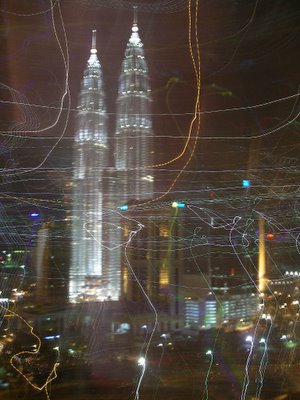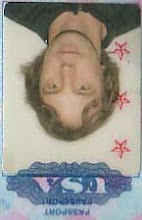Friday, January 27, 2006

It had to happen eventually, and I don't know a better way to say it than I got Poe'd this week on Jack Kimball's blog. The reference to Poe relates to a project engineered by Ben Friedlander I was involved with many years ago. As detailed extensively in Simulcast: 4 experiments in criticism, in 1995-96 BF usurped some of E. Allan P.’s glorious criticism, and replaced names in the essays with contemporary authors. Much of this work was published in a somewhat irreverent (and wholly refreshing) e-zine I put together at the time called Descriptions of an Imaginary Universe (BF has conveniently posted links to some of the essays at http://www.umit.maine.edu/~ben.friedlander/DIU.htm; issues are archived in their entirety at the EPC).
Anyhow, I don’t know Kimball, except for that he published poems of mine in a NYLA issue of an e-zine called The East Village. Well, blogger that I now (at least temporarily) am, I found his site, Pantaloons: Tykes on Poetry, and was *very* humored to see a recent posting in which I am described as “an applied mathematician at the Imperial Normal School of Myramar” who “is developing a package of algorithms designed to spot specific types of text manipulation” because the FBI is “interested in ways of authenticating digital texts presented in Southeast Asian poetry journals,” which never would had existed if I had just stayed at home with idle fingers: http://pantaloons.blogspot.com/archives/2006_01_01_pantaloons_archive.html#113812188380059865.
I fairly quickly figured out that Kimball had taken an article about digitally altered photographs by Nicholas Wade that ran in that day’s NY Times, titled “It May Look Authentic; Here's How to Tell It Isn't,” and for some reason decided to change it to be about poetry. You go, blogger! (That’s what I get for becoming one, and sharing these activities with the world). How I became a name involved is beyond me, but since no malice is apparent I’m completely charmed, & soon after discovering it shared the spoof with several of my MMU colleagues, who of course have never seen (or imagined) anything of the sort…
I checked out a number of blogs in moments of downtime, digging Patrick Durgin’s especially. I got a kick out of J. Spahr’s blog, but mainly because of Bill Luoma’s (sometimes lengthy) interjections of code. I couldn’t really figure out what it was all about, but thought it was cool anyway. I know Bill has been a programmer for a long time, and while I appreciate his reticence in talking about it I’m always wondering what he’s up to (something interesting, no doubt).
Otherwise, it was another focused sedentary day with the chair, desk, and manuscript, repairing sentences every so often. Only the concluding chapter and appendix to go, then a whole lot of time and space will begin to open up, which will be partially filled by prepping lectures and such but will also enable new multimedia projects. One idea that I had today, which I really want to follow up on, came while I was proofing the 4th chapter (“Alternative Arrangements for Digital Poetry”) which covers “fringe” prehistoric forms of digpo, including audio poems. In that section I mention that, “I have yet to encounter a digital poem in which interactivity is engaged by the viewer’s spoken voice.” So maybe that’s something worth exploring. My daughter Constellation is completely hooked on her recently acquired “Nintendogs” Nintendo game, in which she can train her virtual dog tricks by speaking to it (the dog avatar) repeatedly, so it seems like this sort of thing could be done, given the right technological circumstance. Maybe it could not be done (without explicit instructions) on the WWW (yet), but certainly possible on a stand-alone machine with a properly rigged and registered microphone. There are specialists in both audio and games here, and I’ll have to check in with them about it. Since poetry pretty much began as a spoken form, and continues in some parts to be a vital force as an oralized endeavor, this idea makes great sense to me. If crafted properly, the spoken links/commands would become a type of poem themself. Well, I have some other less involved ideas about poems I want to make using TRAVESTY, and was glad to discover that the MMU library has the OED on CD-ROM, so will get busy with investigations having to do with the prefix “Cyber-” (probably a collaboration with Amy, since we’re now denizens of Cyberjaya), and need to conduct a comparative etymology of the words mosque and mosquito as well. We are absorbed in our surroundings, recording everything possible, reading stories and news from the Muslim world…
Definitely rearing to go on some new schemes, and beginning to envisage them in my brain. The whole country is about to go on a 4-5 day holiday (depending on where you live) for Chinese New Year. By the end of it, a new year—set of years—will be dawning for me as well.
Gong Xi Fa Cai, CF
